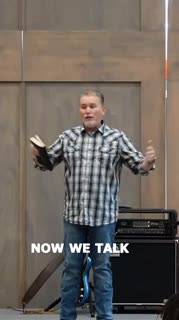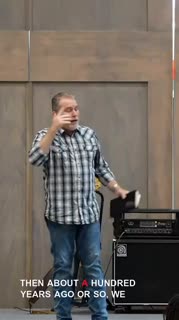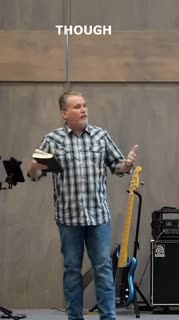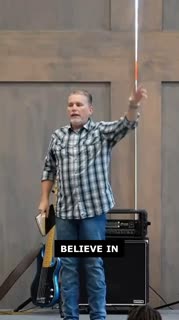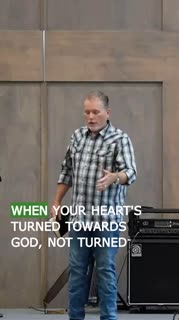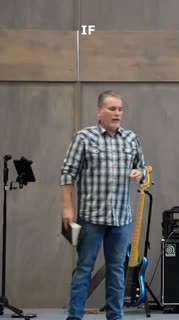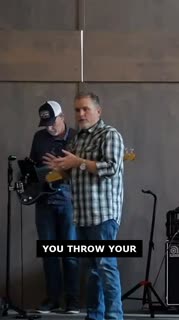Trusting God: The Path to True Fulfillment
Devotional
Sermon Summary
Bible Study Guide
Sermon Clips
1. "Now we talk about flat earthers all the time. Like it's in our vocabulary now. People believe things that we kind of go, that's kind of strange, it's kind of odd. But a lot of times when you have questions, like about what's the world like out there? Or you have questions like, why is everyone right-handed but these couple of people are left-handed? Or questions about science that you understand. We long for answers, right? And so we'll believe things sometimes that don't make any sense because they satisfy a question that we had. And so we're okay with it. Then you get bigger questions, not just why is someone left-handed, but big questions like, how did we exist? How did people get here? Bigger questions about my personal life, like what is my purpose in life? Why do I exist? Not just why are we here on a planet, why do I exist?" [00:02:01] (50 seconds)
2. "Then about a hundred years ago or so, we had a major shift in the way we thought from a supernatural worldview to a naturalistic worldview. What that means, if you're not into understanding worldview stuff, is the naturalistic worldview came with the rise of science that said every answer out there has to be rooted in the natural world, something we can prove, something we can study, something that science points to. That meant people began to reject God who is supernatural. He was above the natural world because he created the natural world. So as we walked away from a supernatural worldview to a naturalistic worldview, where we had to get answers to our big questions from things that we could see and touch and feel and hear, we began to struggle." [00:04:13] (44 seconds)
3. "And even though the science of evolution is flawed and has tons of holes, we hold on to it because it's the best natural answer to a supernatural question. Then in academia, humanism began to rise. The belief and the idea that self-actualization was the answer to all of life's questions. That if you want to know your purpose, you want to know why you're here, you want to know why you exist, you need to understand the inner you, the real you, you need to unlock yourself because all of the answers to all of the questions in the world are found in you being self-actualized." [00:05:02] (37 seconds)
4. "Believe in yourself ends in a desert barren wasteland. Believe in the God who created you and gifted you and called you. It's a life that's full. It's a life that's got blessing. It's the life that's green and fruitful. Now listen, he talks about it. He says drought's going to come. He talks about that. Heat's going to come. It doesn't mean that if you turn your heart towards Jesus that life is rainbows and butterflies all the time. But to turn your heart towards Jesus means that you're planted next to the river where there's daily nourishment. Where every day you find life." [00:19:20] (31 seconds)
5. "When your heart's turned towards God, not turned towards self, you have the God of the universe walking with you every day. And when trouble comes, the heat comes, the drought comes, his arms around you going, I've been there. I've done that. I've experienced things, everything you've experienced and more, and I'm going to walk you through this. But if you are, if you're camped over here in the world of self, and I'm worshiping self and self is who I put my resilience and my trust in when the bottom falls out there's no one to go to you don't have anybody except other broken frail people." [00:22:23] (34 seconds)
9. "If somebody sat down with you at lunch today and said, hey, tell me what God's doing in your life and what you're doing with him. How long would it take you to answer? Would you be able to throw out several things? Again, I get to cheat, pastor, right? Like I get to see a lot of the stuff. You don't get to cheat like me. But would you have an answer? What God is doing? And where you're involved with him and seeing his movement happen? If not, if you go, I don't know. Well, here's your next step." [00:32:05] (32 seconds)
10. "You throw your life into what he's doing and you experience him. So this morning, like your life is more a picture of that barren wasteland and you don't want it to be. See, there's a simple solution. It's not about self. It's not about works. It's not about doing things now, being involved in church. Most things are talking about throwing yourself into what God's doing. It's not about gaining God's favor. It's because God already loves you and you just want to be a part of what he's doing." [00:37:12] (28 seconds)
Ask a question about this sermon
2. "Then about a hundred years ago or so, we had a major shift in the way we thought from a supernatural worldview to a naturalistic worldview. What that means, if you're not into understanding worldview stuff, is the naturalistic worldview came with the rise of science that said every answer out there has to be rooted in the natural world, something we can prove, something we can study, something that science points to. That meant people began to reject God who is supernatural. He was above the natural world because he created the natural world. So as we walked away from a supernatural worldview to a naturalistic worldview, where we had to get answers to our big questions from things that we could see and touch and feel and hear, we began to struggle." [00:04:13] (44 seconds)
3. "And even though the science of evolution is flawed and has tons of holes, we hold on to it because it's the best natural answer to a supernatural question. Then in academia, humanism began to rise. The belief and the idea that self-actualization was the answer to all of life's questions. That if you want to know your purpose, you want to know why you're here, you want to know why you exist, you need to understand the inner you, the real you, you need to unlock yourself because all of the answers to all of the questions in the world are found in you being self-actualized." [00:05:02] (37 seconds)
4. "Believe in yourself ends in a desert barren wasteland. Believe in the God who created you and gifted you and called you. It's a life that's full. It's a life that's got blessing. It's the life that's green and fruitful. Now listen, he talks about it. He says drought's going to come. He talks about that. Heat's going to come. It doesn't mean that if you turn your heart towards Jesus that life is rainbows and butterflies all the time. But to turn your heart towards Jesus means that you're planted next to the river where there's daily nourishment. Where every day you find life." [00:19:20] (31 seconds)
5. "When your heart's turned towards God, not turned towards self, you have the God of the universe walking with you every day. And when trouble comes, the heat comes, the drought comes, his arms around you going, I've been there. I've done that. I've experienced things, everything you've experienced and more, and I'm going to walk you through this. But if you are, if you're camped over here in the world of self, and I'm worshiping self and self is who I put my resilience and my trust in when the bottom falls out there's no one to go to you don't have anybody except other broken frail people." [00:22:23] (34 seconds)
9. "If somebody sat down with you at lunch today and said, hey, tell me what God's doing in your life and what you're doing with him. How long would it take you to answer? Would you be able to throw out several things? Again, I get to cheat, pastor, right? Like I get to see a lot of the stuff. You don't get to cheat like me. But would you have an answer? What God is doing? And where you're involved with him and seeing his movement happen? If not, if you go, I don't know. Well, here's your next step." [00:32:05] (32 seconds)
10. "You throw your life into what he's doing and you experience him. So this morning, like your life is more a picture of that barren wasteland and you don't want it to be. See, there's a simple solution. It's not about self. It's not about works. It's not about doing things now, being involved in church. Most things are talking about throwing yourself into what God's doing. It's not about gaining God's favor. It's because God already loves you and you just want to be a part of what he's doing." [00:37:12] (28 seconds)
